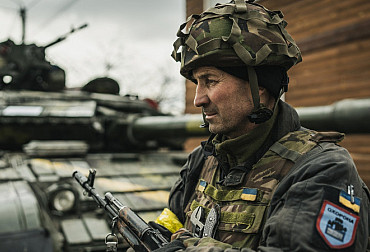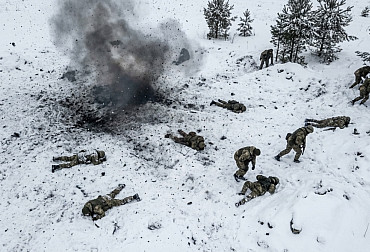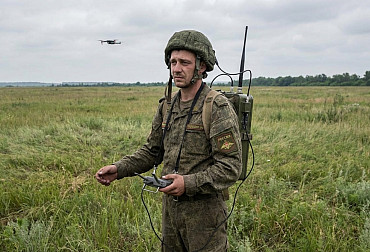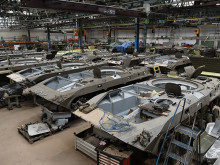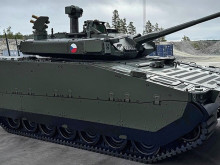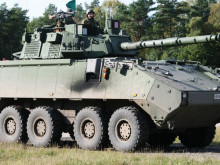A global clash at the gates?
With 2022, we have definitively entered a new multipolar World whose main feature is instability and unpredictability. We are likely to face an era of regional clashes and wars that will reflect the absence of a global superpower to play the role of "world policeman". This period is likely to end only with the emergence of a new leading power that will also establish a new international order. This will emerge from a major global clash between two antagonistic blocs, democratic and authoritarian states, which will wage a fierce struggle over the future shape of the world.
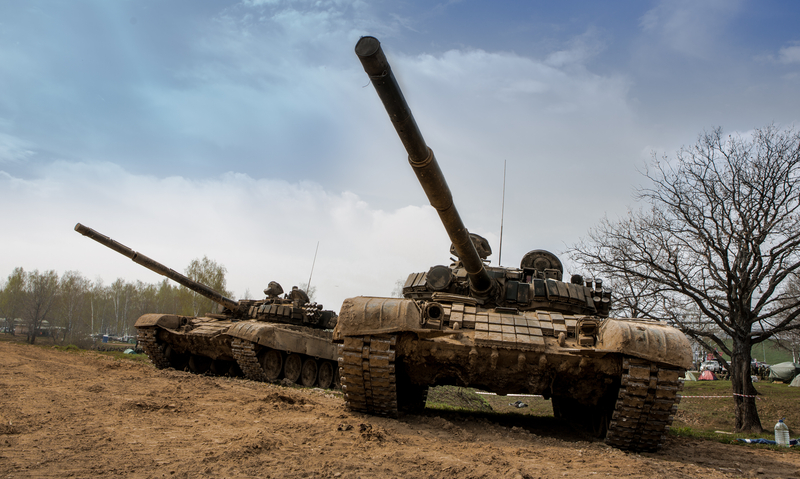 Picture: With the year 2022, we have definitively entered a new multipolar world, whose main feature is instability and unpredictability. (illustration photo) | Shutterstock
Picture: With the year 2022, we have definitively entered a new multipolar world, whose main feature is instability and unpredictability. (illustration photo) | Shutterstock
The Asian detonator
The unipolar world has successfully held back the ambitions of many countries for the last 30 years. This was also true of China, which knew that a direct military clash with the United States of America would not stand. It has therefore primarily focused its global activities on spreading economic influence and gaining support for its goals through hybrid methods. However, with the outbreak of war in Ukraine and the refusal of the US to get directly involved, that world ended. This has opened up space for China to pursue its long-term goals and ambitions at far less risk than was the case just a few years ago. Moreover, it is now also much better prepared militarily. Over the past 10 years, under the leadership of President Xi Jinping, it has devoted itself to systematically strengthening its military capabilities on land, in the air and at sea, has built up a large cyber force and has begun to use space for its operations. Its military is equipped with the latest weapons and technologies and has already caught up with or surpassed the US armed forces in many respects. The Chinese regime has also substantially consolidated its power in the country. Its control over the lives of all its citizens has reached unprecedented proportions, and it has come down hardest on the people of Tibet, Xinjiang and Hong Kong in order to stifle any separatism on their part. But the regime itself has also been transformed. President Xi Jinping has become the country's virtually unlimited ruler, dealing with all potential rivals in the party and concentrating enormous power in his hands. His leadership should be definitively confirmed at the 20th Congress of the Communist Party of China in October, which should also set the direction the country should take in the next five years. No one doubts that this will be the direction that Xi Jinping will set. He made it clear last autumn that his main priority remains the 'reunification' of China, but that this has long been hampered by Taiwan's independence. This obstacle must therefore be removed in order to complete the process.
Taiwan is well aware that its independent existence is now truly at stake. The international situation has changed significantly, to the detriment of its current security guarantor, the US. The American attitude towards the war in Ukraine has sown serious doubts among the Taiwanese people about the real readiness of the US to defend the island in the event of a Chinese attack. Although the U.S. is trying to be more active in the Asia-Pacific region and strengthen military cooperation with both Australia under the AUKUS security pact and Japan, which sees China's growing ambitions as its immediate threat, many countries in the region are hesitant to clearly lean one way or the other. Only in recent months has South Korea, after years of peace efforts and inter-Korean dialogue, begun to wake up to the fact that changes in the global balance of power may prompt its northern neighbour to attempt to change the status quo through military force, and that it needs to think in a broader geopolitical context. Yet South Korea is also heavily dependent on US security guarantees and the missile umbrella. If China and North Korea were to launch military strikes simultaneously, the US would find itself in a very difficult position. Getting commitments to defend Taiwan and South Korea, despite the presence of U.S. troops in the region, would be beyond them in the face of two nuclear powers. Moreover, in such a case, it can be expected that the conflict would escalate further and that other key countries in the region would be drawn into it, not only Japan, but above all the two nuclear powers neighbouring China in the south of the continent. The age-old rivalry between India and Pakistan, reinforced by Chinese power ambitions, would very likely escalate into open war again.
Tensions in the Middle East
Instability in the Middle East region has been causing problems for countries in its immediate and more distant neighbourhood for more than 10 years. Syria, Iraq and Libya have become dysfunctional states whose governments have ceased to control the territories they used to administer following the civil unrest of the so-called Arab Spring and the withdrawal of US troops from the area. This vacuum was filled by the Islamic State, which occupied large areas of these states for several years and imposed a harsh regime of repression and terror on all those who refused to submit to Islamic law. After the international intervention and defeat of the Islamists, regional powers began to fill the space. Turkey and Iran, in particular, are actively asserting their influence and interests, having already divided Syria and Iraq to a large extent. Saudi Arabia, in turn, is projecting its influence, particularly in Yemen, where it has been intervening militarily against Shiite rebels backed by Iran for several years. It is the power ambitions of Iran and Saudi Arabia that could easily plunge the region into further conflict, especially if Iran completes the process of producing its nuclear weapon despite international sanctions. It is already clear that this is only a matter of time, as it has sufficient enriched uranium to produce more than one such weapon. Israel, so far the only nuclear power in the region for which a nuclear Iran poses a vital threat, is also preparing for a potential clash with Iran.
Once again, the US position and the American willingness and readiness to intervene militarily in the region will play a key role. The operation against the Islamic State has essentially been limited to air strikes, but in the event of a wider conflict involving a nuclear-armed Iran, only partial involvement will not stop aggression. The US does have a significant number of air and naval bases in the region, both around the Persian Gulf in the Arabian Peninsula and in Turkey itself, but without the deployment of US ground forces its existing allies will have to defend themselves. Israel is prepared for such a scenario and has long experience of fighting to defend its existence. Turkey, on the other hand, is in a specific position. It is a member of NATO, but it also has its own regional interests and ambitions, not only in the Middle East, but also in the adjacent South Caucasus and the Eastern Mediterranean. It is able to reach a pragmatic agreement with Iran, while it has had strained relations with Saudi Arabia in recent years. However, this has changed in recent months. The two countries have moved to normalise their relations, which will significantly strengthen the common front of Sunni states against Shiite Iran, while also bringing America's main allies in the region closer together again.
Europe in a pincer
Russia's aggression in Ukraine caught European states by surprise and caught them largely unprepared, politically, economically and security-wise. A completely misjudged situation and a long-standing policy of appeasement towards Russia, promoted by Germany and France, has led Europe into its worst problems since the end of the last world war. European countries have become very vulnerable, not only because of their dependence on Russian energy resources, especially natural gas, but mainly because of their unwillingness to confront the aggressor by force, which makes them blackmailable by other world players with expansionist ambitions. First and foremost is China, on which Europe has built up an even greater dependence in recent years than on neighbouring Russia. The shift of European industrial production to China, which has been taking place in recent decades for cost and environmental reasons, is now proving to be a major threat and vulnerability at the same time. Indeed, as the coronavirus pandemic has already indicated, the disruption of supplies of certain products from China could easily become an intractable problem for European economies. Moreover, China is deliberately building a monopoly in certain sectors, particularly in the field of modern technology, in order to deepen the dependence of other countries on its production. For example, it is already the world's largest producer of solar panels or batteries for electric cars.
This is not good news for Europe. Its plans for strategic autonomy in key sectors have come too late, not to mention the fact that the reluctance to give up trade opportunities and low-priced products is still considerable among European countries. Germany and France are once again leading the way in this regard, and, as in the case of Russia, they are relativising the Chinese threat and refusing to jeopardise their prosperity with more costly solutions. They believe that an agreement with China is possible and that they will be treated as equal partners. However, they will again pay heavily for this further misjudgement, and so will the entire European Union. In the case of China, Europe will no longer have a choice; the only alternative to war will be permanent vassalage.
Will the dark side of the Force prevail?
A military clash between democratic and authoritarian states over the new shape of the international order is inevitable. The world built on the domination of the democratic bloc led by the United States of America is over. Weakened by crises and internal problems, it is no longer able to contain the rise to power and the ambitions of authoritarian regimes. But if Western democracies want to survive, they will have no choice but to fight again for their freedom and independence in another global war. For only the measure of power on the battlefield will show who is entitled to determine the kind of world we will live in. Whether this world will continue to be a predominantly democratic one based on respect for international law, or whether it will be a totalitarian world ruled by force, in which human rights and freedoms have no place. In the previous two world conflicts the dark side of the Force was always defeated, although in the latter case the victory of the democracies was only partial with the emergence of a bipolar world for a few decades. Let us hope that we will be able to prevent the world's descent into darkness this time as well. It will all depend on our determination to defend our values to the end, even at the cost of the greatest losses.
Martina Heranová, Ph.D.
She is an analyst and consultant in the field of international politics. She is a lecturer at the CEVRO Institute. Previously, she worked at the Ministry of Foreign Affairs (2002-2013), where she held a number of diplomatic positions, including Deputy Ambassador at the Embassy in Lithuania. She specializes in international security issues (e.g. geopolitics and global security challenges, Russian and Chinese influence operations) with an emphasis on the Central European region.











